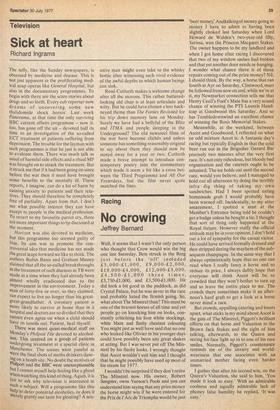Television
Sick at heart
Richard Ingrams
The telly, like the Sunday newspapers, is. obsessed by medicine and disease. This is not just apparent in the proliferating medical soap operas like General Hospital, but also in the documentary programmes. To begin with there are the scare stories about drugs and so forth. Every cub reporter now dreams of uncovering some new thalidomide shock horror. Last , week Panorama, at that time the only surviving BBC current affairs programme — now it, too, has gone off the air — devoted half its time to an investigation of the so-called ECT treatment of patients suffering from depression. The trouble for the layman with such programmes is that he just is not able to evaluate them. There was much talk as usual of harmful side effects and a ritual MP was brought on to attack the treatment. But it struck me that if it had been going on since before the war then it must have brought some benefits to the mentally ill. These reports, I imagine, can do a lot of harm by causing anxiety to patients and their relatives. They should therefore be completely free of partiality. Apart from that, I don't see what possible interest they can have except to people in the medical profession. To revert to my favourite parrot cry, there are more important things to be discussed at the moment, Horizon was also devoted to medicine, but this programme too seemed guilty of' bias. Its aim was to promote the controversial idea that medicine has not made the great leaps forward we like to think. The authors Robin Bates and Graham Massey Claimed that all the so-called breakthroughs in the treatment of such diseases as TB were made at a. time when they had already been almost wholly eradicated due to the improvement in the environment. Today a man of forty-five or over, so they claimed, can expect to live no longer than his greatgreat-grandfather. A coronary patient is more likely to survive at home than in a hospital and doctors are so divided that they cannot even agree on when a child should have its tonsils out. Patient, heal thyself. There was more quasi-medical stuff on Monday's Phi/pot: File devoted to alcoholism. This centred on a. group of patients undergoing treatment at a special clinic in Manchester. The scenes were painful as Were the final shots of meths drinkers dancing on a bomb site, No doubt the motives of Philpott and the BBC were unexceptionable but I cannot myself help feeling like a ghoul When watching this kind of thing. Again, it is l'air to ask why television is interested in such a subject. Will a programme like this help to deter potential alcoholics, or does it
merely gratify our taste for gloating? A sen
sitive man might even take to the whisky bottle after witnessing such vivid evidence of the awful depths to which human beings can sink.
Rene Cutforth makes a welcome change after all the morons. This rather batteredlooking old chap is at least articulate and witty. But he could have chosen a less hackneyed theme than The Forties Revisited for his trip down memory lane on Monday. Surely we have had a bellyful of the Blitz and ITA4A and people sleeping in the Underground? The old newsreel films of the war have become clichés and unless someone has something reasonably original to say about them they should now be stored away for a year or two. Cutforth made a brave attempt to introduce contemporary poetry into the commentary which made it seem a hit like a cross between the Third Programme and All Our Yesterdays, but the film never quite matched the lines.


































 Previous page
Previous page